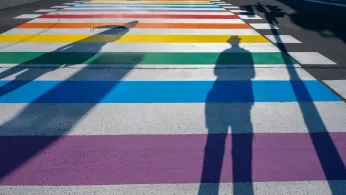
3 hours ago
Florida Police Guard Pulse Memorial Crosswalks Amid Statewide Removal of Rainbow Symbols
READ TIME: 3 MIN.
Florida is witnessing a tense standoff between state authorities and LGBTQ+ advocates as police officers are now stationed at the Pulse memorial in Orlando to prevent the reappearance of rainbow crosswalks. This escalation follows a statewide directive to eliminate Pride-themed crosswalks, igniting protests, grassroots activism, and national attention on the issue of LGBTQ+ visibility in public spaces .
The Pulse memorial holds profound significance for the LGBTQ+ community, commemorating the 49 lives lost in the 2016 massacre at the Pulse nightclub—one of the deadliest attacks targeting LGBTQ+ people in U.S. history. Rainbow crosswalks at the site have served both as a symbol of resilience and as a tribute to those killed .
Earlier this week, Florida became the first state to act on a call from U.S. Transportation Secretary Sean Duffy, who sent letters to all 50 governors urging the removal of Pride crosswalks. State officials quickly moved to repaint the rainbow-striped crosswalk at the Pulse memorial in black and white . The following morning, residents arrived with chalk and paint, restoring the rainbow hues by hand—a gesture of defiance and solidarity .
The back-and-forth over the crosswalk has intensified, with state road crews repeatedly painting over the rainbows and community members just as quickly restoring them. In response, authorities have now deployed as many as six police squad cars to guard the crosswalk, their explicit mission being to prevent the reemergence of rainbow colors at the Pulse memorial. This unprecedented police presence has drawn criticism from LGBTQ+ advocates and local residents, who view it as both intimidation and an attempt to erase LGBTQ+ history and visibility .
Witnesses at the site described shifting rules and increased law enforcement throughout the day. “The police came over several times and made-up rules. There were a couple of times when I asked questions and then they back down… we’ve been here, they’ve changed what the rule is at least four times,” said Winter Park resident Jill Hakemian . Stephanie Vanos, an Orange County School Board Member (speaking in a personal capacity), added, “Oh, I think this is straight up intimidation. That’s what this is about. That’s what is happening here. They are trying to intimidate people by having more, more officers here so that people will be afraid” .
The Pulse memorial is not alone. Across Florida, other cities—such as Fort Lauderdale, Miami Beach, Key West, and Delray Beach—have received non-compliance letters from the Florida Department of Transportation (FDOT) demanding the removal of artistic crosswalks and murals that include rainbow symbols .
Local leaders and community groups have been quick to denounce the removals. Fort Lauderdale Mayor Dean Trantalis described the move as “an attempt to try to erase the presence of anything to do with the LGBTQ community,” emphasizing that the rationale provided by the state—public safety—lacks credibility .
In response to the orders, demonstrations have been organized in Fort Lauderdale and other cities. Protesters have gathered at targeted crosswalks, vowing to resist the removal of LGBTQ+ symbols from public spaces .
For many LGBTQ+ Floridians, the removal of rainbow crosswalks is more than a matter of paint—it is a direct attack on visibility, community, and hard-fought recognition. Activists argue that symbols like rainbow crosswalks are vital for fostering a sense of belonging and honoring those lost to violence and discrimination.
Nadine Smith, executive director of Equality Florida, echoed the sentiment of many: “We refuse to be erased. We will not let hate win” .
The ongoing debate has also galvanized allies and local leaders who see the removal of Pride symbols as part of a broader rollback of LGBTQ+ rights and representation in Florida. “It could be the gay community this year—who knows what’s going to be next year… We don’t know where they are going to keep trying to eliminate the diversity of what represents Florida,” said Mayor Trantalis .
The developments in Florida have drawn national attention from LGBTQ+ advocacy groups, civil rights organizations, and media outlets. The situation has become emblematic of ongoing tensions over LGBTQ+ representation in public life and the importance of memorial spaces for marginalized communities.
Some legal experts have raised questions about the legitimacy of the state’s actions, suggesting that the removal of LGBTQ+ symbols from public spaces could be challenged under First Amendment protections or anti-discrimination laws .
As of this week, law enforcement continues to guard the Pulse memorial crosswalks, and residents continue to organize and resist. Demonstrations and acts of community solidarity are expected to continue, with advocates calling for national support and heightened awareness of the importance of LGBTQ+ visibility and inclusion in public life .
As the standoff continues, the painted crosswalks of Florida have become a focal point for a broader conversation about identity, memory, and the right to occupy public space with pride.






